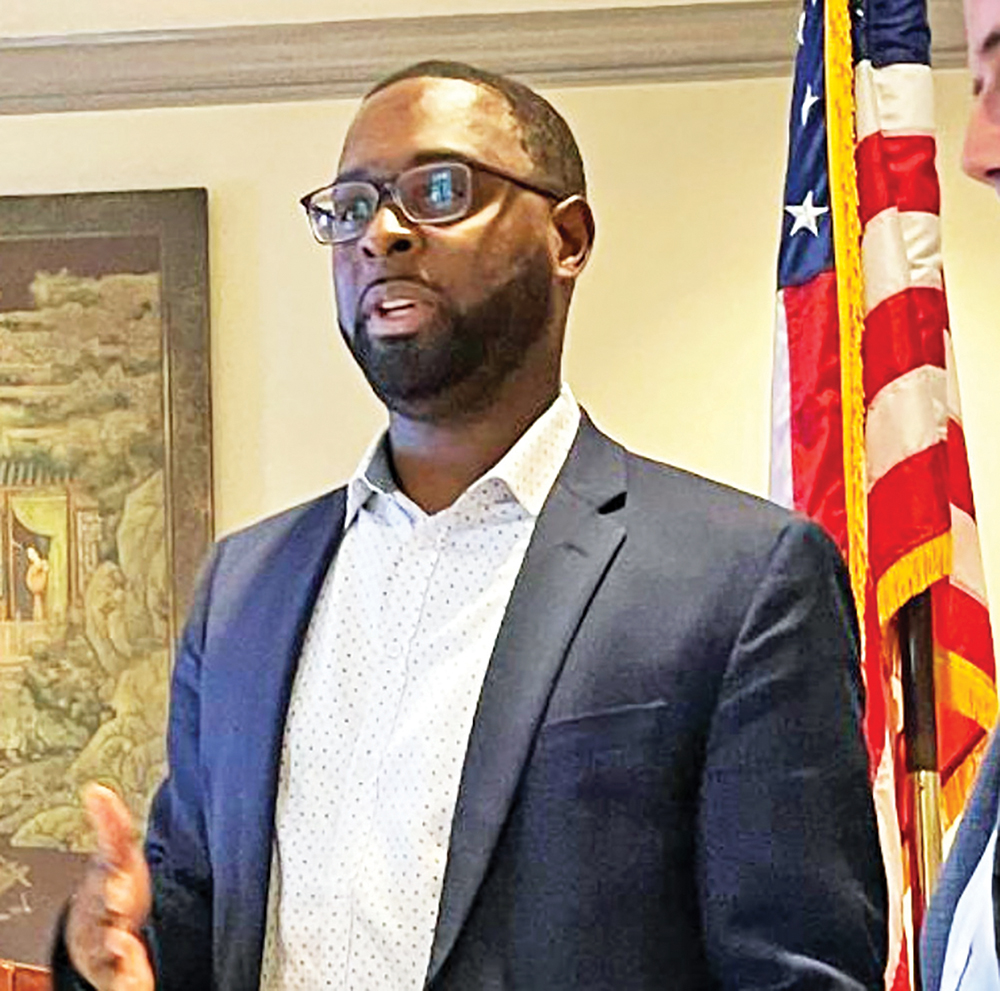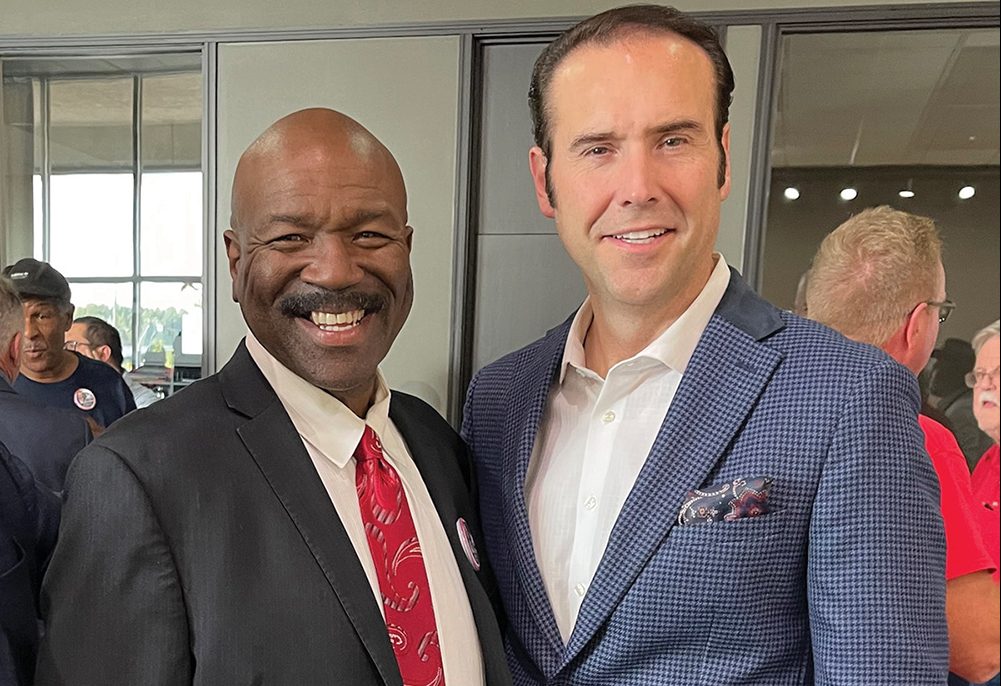Even as candidates for city office gird for an October 8th election, which is still weeks away from its stretch drive, another election of some possible consequence is just around the corner.
On Monday, the Shelby County Commission will elect a chairman to serve for the 2015-16 period, and, while other commissioners are quite likely considering their options in case of deadlock, at least two members of the commission — Steve Basar and Terry Roland — are more or less publicly running.
Both, interestingly enough, on a 13-member body which has a Democratic majority of one, are Republicans. Basar, however, is a de facto Democratic candidate, hoping to gain through an active coalition with members of the other party an office which he believes himself to have been unfairly deprived of by members of his own party.
A year ago, Basar, an East Memphis Republican who was then serving as commission vice chair, confidently expected elevation to the chairmanship as a matter of course.
For the first several years after the commission became subject to partisan elections in the mid-1990s, the tradition was to elect a chairman from one party in a given year, along with a vice chairman from the other. At the end of that year, the vice chair would be formally elected to become chair for the next year, in a routine whereby the succession to chairman was essentially foreordained, and the commission’s chairmanship was, by what was termed a “gentlemen’s agreement,” rotated by party annually.
That was the format which Basar expected to apply to his own case when a newly elected commission met to select a chairman after the conclusion of the August 2014 county election.
But Basar encountered a body which contained five new members, and the once-predictable rites of succession to the chairmanship had been jimmied and could no longer be depended on.
That all began with the election for chairman in 2011, when then Republican vice chair Mike Carpenter, who had angered his GOP colleagues by what they considered too close a collaboration with the commission’s Democrats, failed to get Republican votes, and Democratic chairman Sidney Chism parlayed the resulting deadlock into reelection for a second consecutive term.
From that point on, even as the principle of rotating chairmanships seemed to have reasserted itself to some degree, there was always an element of suspense in the matter of electing a chair, as well as a fair amount of intrigue.
When Republican Mike Ritz succeeded Democrat Chism as chair in 2012, he in effect became chief strategist for the Democratic majority’s opposition to independent suburban school districts and ran afoul of his GOP colleagues, as Carpenter had done previously.
In 2013, as Chism had done before him, Ritz sought a second consecutive term, but once again the Republican minority coalesced around what they considered a sympathetic Democrat, James Harvey, who won with their support. And, in 2014, GOP members continued with what had seemingly become a strategy of supporting a compliant Democrat over a fellow Republican, backing eventual winner Justin Ford over a stunned Basar.
In the wake of his defeat, Basar entered into a coalition with the commission’s Democrats on key vote after key vote, beginning with their efforts to limit Ford’s chairmanship powers last fall, and continuing through this year’s budget negotiations.
Basar still wants to be commission chairman, though he has also offered himself as a possible successor to Paul Morris, who is stepping down as chairman of the Downtown Memphis Commission.
Meanwhile, Roland makes no bones about it: He wants to be Shelby County Mayor, is essentially already running for that office, which is up again in 2018, and clearly believes that becoming commission chairman would give him a leg up on that race.
Roland hails from Millington, was elected to the commission as a GOP firebrand, and can still comport himself that way, depending on the issue. But he has made an obvious effort to mute his partisanship and work across party lines. He led the effort to put the commission on record as supporting Governor Bill Haslam‘s Insure Tennessee proposal, and the successful resolution to rename the Shelby County Courthose for the late civil rights icon D’Army Bailey was proposed by Roland.
• Meanwhile, on the Wednesday agenda of the commission’s general government committee is the still simmering issue of the Nathan Bedford Forrest statue and Forrest graves in what was formerly Forrest Park (Health Sciences Park).
Again before the commission is a resolution sponsored by Commissioner Walter Bailey that would put the commission on record as supporting the Memphis City Council’s ordinance to remove the statue, which was due for a second reading at this week’s council meeting. The commission’s resolution supporting the council’s intent was deferred from the committee’s July 22nd meeting.
Any action by the commission would be purely symbolic, inasmuch as only the council has authority regarding disposition of the statue. But whatever the commission does would definitely have an effect on public opinion during what is expected to be a lengthy course of litigation over the issue.
The city council’s sentiment has so far remained unanimous for removal, but indications are that reservations by suburban members of the county commission could make for controversy.
The commission’s budget committee is likely to get into something of a thicket, too. Budget chair Heidi Shafer wants the commission to take up the issue of establishing a staff or hiring an individual to perform for the commission the same kind of independent vetting service over financial matters that the Congressional Budget Office does for members of Congress.
Shafer and other members of the commission, on both sides of the party line, were plainly vexed by seemingly disparate accountings issued by the administration of Mayor Mark Luttrell and County Trustee David Lenoir, respectively, on the actual amount of an end-of-fiscal-year surplus.
There is a strong and bipartisan sentiment on the commission to assert the body’s independence vis-à-vis the administration, as was also indicated recently by the commission’s open exploration of the prospect of hiring its own attorney, at least for ad hoc matters.
• It was neither the most surprising action nor the most momentous one of the 2015 Memphis election season, but the joint endorsement of Councilman Harold Collins‘ mayoral campaign on Monday by the Memphis Fire Fighters Association and an independent firefighters’ group was another sign of an apparent recent surge of support for Collins.
The councilman from Whitehaven was fairly universally judged to have acquitted himself well in a four-way mayoral forum last week put on by several local women’s groups at First Congregational Church.
And, though Collins’ financial receipts still lag behind those of Mayor A C Wharton and Councilman Jim Strickland, they have been significant enough to suggest the possibility that talk of a two-man mayoral race between Wharton and Strickland may have been overdone — or, at any rate, premature.
The opening by Mayor Wharton on Sunday of a Whitehaven-based headquarters on Elvis Presley Boulevard, to complement another headquarters on Poplar Avenue (to be inaugurated this coming Sunday), is a clear indication that the mayor has a two-front war on his hands.


